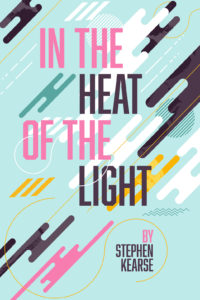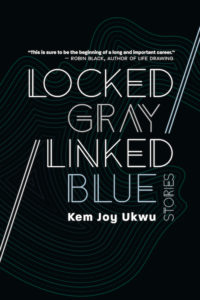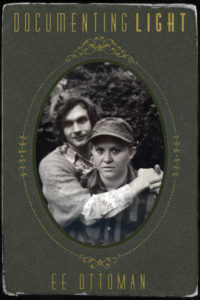
Let Me Look at You
Michael J. Wilson
Kindred Books • Release Date: May 27, 2025
Print ISBN: 978-1-948559-49-2 • Ebook ISBN: 978-1-948559-52-2
Brain Mill Press offers Let Me Look at You in ebook and trade paperback editions. Ebook buyers receive access to EPUB and PDF files, offered without DRM restrictions. Print book buyers receive a physical copy of the book and access to the ebook files in all formats.
Michael J. Wilson’s character-driven debut captures the loneliness of urban millennial life and the peril of becoming enamored with strangers solely through their social media personas.
“Contessa became a fixture in my mind a year ago when I saw her board the train.” So begins protagonist Adrian Bellinger’s obsession—a chance encounter with a strange woman ignites a pursuit that exposes the numb intimacy of the digital age. Dissecting the culture of online behavior in the not-quite-here-and-now of Brooklyn, New York, Let Me Look at You is both a seductive whisper and a frustrated demand suggesting that the thresholds of pathological behavior have shifted as technology changes our daily habits and behaviors.
For fans of Teju Cole’s Open City and Michel Houellebecq’s The Possibility of an Island, Let Me Look at You introduces a promising new voice in the literary landscape.
ABOUT THE AUTHOR
Born in Los Angeles, Michael Wilson studied literature and philosophy at Howard University and the New School. Today, he lives in rural California with his wife and three children.
AN EXCERPT from Let Me Look at You by Michael J. Wilson
© Michael J. Wilson, 2025. All rights reserved.
Chapter One
Contessa became a fixture in my mind a year ago when I saw her board the train. She found a seat near me and started reading a book by Paul Laurence Dunbar—I couldn’t make out the title. As the train carried us out of Brooklyn, I watched as she read from the middle of the book. At about three o’clock, she caught my glance and smiled. I wanted to walk over and say something to her, but in the next moment she left the train. She looked back at me and said, “Bye, Adrian.” She knew my name, and I didn’t know hers. The thought both frightened and fascinated me. From that day forward, she became my obsession.
Before then, my love life was uneventful. I had spent passionless hours in front of the TV or seated at the dinner table with women whom I’d met through friends. But Contessa (a name I invented for her because of the noble way she entered the train and sat directly across from me) bore the promise of endless fascination; she was the first woman who came to me as a stranger. Our eyes met accidentally.
I should say now that I am not moved merely by the looks of a woman. I happen to know that beauty without intellect is an impressive ship lost in a fog. Unable to plot a course for itself, it cuts through the ocean at the discretion of the waves, never certain if it will see the harbor or stay plunged in darkness forever, the grandness of its construction rendered useless.
So when I make initial contact with a woman, the first thing I take into account is not so much her face, but her expression. Is there any light there? Is there softness? Or has her light been extinguished, her visage resigned to dullness and moodiness? Contessa had a beautiful face, to be sure, but it was her countenance that subdued me. We only made eye contact twice; she looked up at me first. Although I said nothing to her, I knew that we had initiated a little game; we were starting a kind of dance where one has to stoke all the cravings of love from afar. If this little scrimmage is performed successfully, then the more aggressive forms of courtship can be slowly introduced.
She walked onto that late afternoon train in Brooklyn and sat across from me wearing a turquoise, loose-knit sweater that revealed her collarbone. She wore a pair of light blue jeans tucked snuggly into brown boots. A knit cap matching her sweater sat on her head, half-revealing an unruly hairstyle. All of this was made more dramatic by her red lipstick, which gave her the look of a young girl trying to look more adult, mature and slightly jaded.
Her intelligence was radiant; she owned a set of high cheekbones infused with enough warmth to retain the softness of her features. Her outfit and makeup were far from remarkable. Jeans on a woman have a way of dampening my lust, but judging from the brief moment when I saw her saunter onto the train I knew that she belonged in elegant robes. She struck me as a descendent of the Egyptians, fully able to trace her lineage back to the nineteenth dynasty, propelled forward in time yet sworn to secrecy in order to move about New York without causing a stir. Nevertheless, I was affected.
That same day, when I got home, I looked online to read the horoscope for Virgo. I wanted to know if it said anything about finding a new love. It didn’t. When horoscopes match reality, we say that the stars are truly powerful and hold a mystical control over human affairs. When they don’t, we dismiss them as senseless. Of course, I could not be deterred so easily. I began plotting the next day’s encounter. It was during that planning phase that I came up with the name “Contessa.” I estimated that it was about twenty minutes after three o’clock when she boarded a Manhattan-bound train at Atlantic. She made her escape from me at Fourteenth. Where was she going? She had no excess bags, so she couldn’t have been shopping. She was traveling alone. She didn’t seem to be dressed for a job. Was she just visiting New York for the day? That would have been horrible, and I consoled myself with the thought that, as it was fall, she was probably a student. But how could I be certain? There was only one way to know for sure, and it involved taking the same train at the same time the very next day.
In preparation, I went about putting together a perfect ensemble in which I would make the grandest impression on Contessa so that she would not hesitate to give me her real name. Approaching a woman on the street is a delicate affair; one must be careful not to startle her at any point during the confrontation. The man should look well-kept and be smartly dressed. He should be confident yet graceful. To obtain the little victory of exchanging numbers, he should time his approach so that it seems unthinkable to the woman to let the moment vanish without a sequel. The first impression, that moment when I step out of the tapestry of city life and become a single, vivid person to her, must be handled with the greatest care. I must deliver myself up as mysterious but not secretive, ready for the sexual act but not searching for it that evening. She will make up her mind in a matter of seconds; if she gets on well with me then I can enter the next phase. If I am blown off, more care is necessary to get her to see just what it is she has tried to disregard.
My attire would be the first thing she would notice if she were to see me from afar. A man’s closet should be limited to just a few high-quality and versatile pieces. I’m thinking of the white collared shirt, the leather jacket, the sport coat: the look of an urban professional. For Contessa, I chose a leather jacket and a white shirt paired with dark blue jeans, black dress shoes, and a gold watch that would expose itself only when I extended my arm to hug her. I ironed the shirt and hung it on the closet door. The jeans I kept folded and the watch I placed near my cologne and deodorant, all to be worn the next day. With these particulars in order, I sat in a chair opposite my bed and began thinking of ways to establish contact with Contessa. I only had a small amount of information to go on. She was about five foot four. She was not a snazzy dresser—at least not during the week—and she wore her hair in the natural style, which could have meant that she lived in Brooklyn, like me. Perhaps she went to school along the 3 train. Maybe she was a photography student. But then, where was her camera? She could have been on her way to a poetry reading. “That was it!” I thought—she must be a poet. Why else would she have Brooklyn hair and a noble expression? It would do me some good, then, to brush up on some of the famous poets who weren’t men. I had not touched them since college because most of the modern ones struck me as too feminist, wary and leery of men like me. This is why I gave my admiration to the earlier women, like Hurston and Grimke. I thumbed through my old copy of the Norton anthology and found the works of Phyllis Wheatley, whom I held in the highest regard. Wheatley commands a certain respect among lovers of verse even though her oeuvre is perhaps the least known among the greats. To quote a few lines of her work to the would-be black poetess of today is to take control of the game altogether.
Just the same, I would be amiss if my intentions were to flaunt information unknown to my prey. One must inject a bit of flattery into a conversation about poetry. Every girl wants to believe she has some in-depth understanding of spoken word or the verse of Gwendolyn Brooks, but to ensure that my flattery is aimed perfectly, I like to quote the works of our timeless singers like Lauryn Hill and Erykah Badu whenever I’m asked, “Who are some of your favorite poets?” They don’t bother over the little things like nails and cars, and they see in love the union of souls, not a mere business arrangement.
There was a possibility that Contessa might not be a poet. One brief encounter on a crowded subway car was not enough to be sure. It would be better to simply throw myself to the wind and seek her out on the subway the next day. Ordinarily, I would have smoked a small cigar and watched videos online just before bed, but I decided against my routine. I needed my face to be as bright as possible for the next day. The tobacco would have dried me out and made my face too pale to make my approach successful. At 9:30 p.m., I turned out my lamp, turned the radio volume down to a whisper, and promptly went to bed.
It was fifteen minutes to three, and if I walked quickly, I could be at the 3 train platform in time to catch Contessa as she boarded. I weaved through a circus of tourists, beggars, performers, and wanderers. A construction worker who was walking with his head down as he swiped away at his phone bumped into me. He didn’t even acknowledge me. There was no use saying anything to him; I couldn’t risk a scene that might make me late for my rendezvous. Besides, it was a fight that I most certainly would have lost. Just looking at his burly knuckles and ripped jeans reassured me that an altercation would have meant my downfall. I wiped the thought from my mind and forgave him. Walking farther along, my path was blocked by a stream of tourists flowing up from a lower level. There must have been fifty of them, perhaps a dozen or more families. The fathers cradled cameras and wore closed-toe sandals with Old Navy fleece; the mothers donned capris and fanny packs; and the children—still reeling from the thrill of their train ride—wore miniaturized versions of their parents’ clothes. Some of the smaller kids looked at me like a curiosity. I grinned, believing it to be the appropriate counter to their innocence, but I was also embarrassed.
The children looked spotless against the backdrop of underground New York. One could almost have called them uncontaminated—like those little pristine cherubs in Renaissance paintings—were it not for their goofy socks, popsicle-stained fingers, and general air of confusion as they argued over which train would take them to the Statue of Liberty. The group finally decided on a direction, and the foot traffic in the station filled in the space they had left behind when I heard someone yell out my old college nickname. “Addy B!” I shivered.
The only people who shortened my name from “Adrian Bellinger” to “Addy B.” were friends from school. It was a well-intentioned way for them to show they liked someone, butchering a person’s name like that. It would have been taken as rude if I had kept correcting them, so I let it slide, though it always secretly annoyed me. But to hear that name yelled out in a crowded subway station, as if I were at the heart of some scandal, was the very height of embarrassment. I turned toward the voice. It was none other than Marcelle Lockett, my former roommate who had been expelled sophomore year for selling weed out of the dorms. He was from California, and this was the first time I had seen him since he popped up at a nightclub during my senior year of college. He had arrived clean-cut, well-dressed, and with drugs to sell. He immediately became the center of attention. There was no sign that he’d been fazed by the break in his education; in fact, he looked better than he did when he was a student. Marcelle was a flashy dresser. He had arrived at that party wearing a blue, trim-fit Versace suit. By the end of the night, he had managed to persuade two girls to sit in a lounge chair with him in the back of the club. By then, he was only wearing his pants.
Now, in the train station, he waded through the crowd toward me with outstretched arms. The sight made me smile, a real smile.
“You in New York too now?” and he gripped my hand to pull me in for a hug. Marcelle was younger than me but had the confidence of an older brother.
“Well, how long you been up here for?”
“Like eight months,” I said shyly. I didn’t want to sound like a new New Yorker.
“Damn, man. I got here last week. I love it up here!”
I was relieved. “You got a place yet?”
“Nah, I’m crashing on—you know Jessica Walton? I’m staying on her couch until I find something.”
Jessica Walton lived in Bed-Stuy, three blocks up from me. “Does she still stay on Monroe?”
“Yep. Crazy thing is, I’m not even fucking. I’m trying to move up out of there before I do, though; she’s not even my type.”
What Marcel meant by type had everything to do with Jessica’s looks, but she was only unattractive to me because she couldn’t hold a conversation to save her life. She was one of those quiet, only-say-one-word-when-spoken-to types. Not for me. As for Marcelle, his good looks had not faded. He was smart and still handsome, with a courageous face boasting high cheekbones and a deep black complexion. He wore a plain white V-neck shirt with a black ball cap turned backward. His silver watch sagged on his wrist and traveled halfway down to the elbow whenever he lifted his skinny tattooed arm. I’d never taken the time to look closely at his tattoos, but I was able to make out some Aztec symbols and a sperm whale traveling along the side of his bicep.
“You still on Facebook?” he asked, pulling out his phone.
Time was running out. I had to get to the platform. The conversation had to end quickly but politely. Marcelle was a good person to know.
“I am, but just take my number and text me for now, I’m already late for this train . . .”
He understood. “Cool, go head and type it in.”
He looked admiringly at the contact information I had entered as if it were the final piece to a puzzle. “Cool, I’m gone hit you tonight, I’m throwing a party.”
“Really? Where?”
“Jessica’s,” he said with a hint of mischief.
We shook hands again and went in separate directions. My water bottle was empty, and I’d started to sweat. I had no choice but to jog to make up for lost time. I thought I would turn a corner and bump right into Contessa, knocking her down, at once succeeding and failing to make a lasting impression on her.
I reached the platform for the 3 train at 3:02 p.m. The timer read “2 MINUTES” before the next train would arrive. Slowly, I scanned the platform like a hawk. Every black woman in sight was analyzed and compared to the image of Contessa I held in my memory. No sign of her. There were two women standing a small distance away, both wearing natural hair in the style of Contessa, but their faces were so foreign, so drastically unlike my lover’s, that I thought the gods were playing a miserable joke on me. I wanted to walk up to both of them and tell them they were a source of confusion and misery and that they should leave altogether. Before I could, the 3 hissed into the station, spewed out a set of riders and sucked up another, then rattled back into the tunnels. She was still nowhere in sight. Either Contessa hadn’t come or the Midwestern family and Marcelle had caused me to miss her. I had failed. At 3:37 p.m., I walked back to the A and took it home.






 EE Ottoman grew up surrounded by the farmlands and forests of Upstate New York. They started writing as soon as they learned how and have yet to stop. Ottoman attended Earlham College and graduated with a degree in history before going on to receive a graduate degree in history as well. These days they divide their time between history, writing, and book preservation.
EE Ottoman grew up surrounded by the farmlands and forests of Upstate New York. They started writing as soon as they learned how and have yet to stop. Ottoman attended Earlham College and graduated with a degree in history before going on to receive a graduate degree in history as well. These days they divide their time between history, writing, and book preservation.
